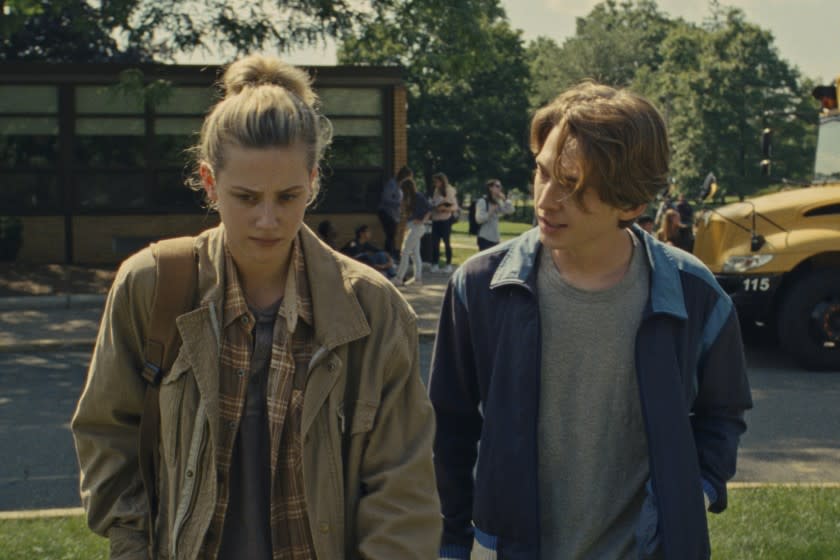Review: Love hurts. 'Chemical Hearts' attempts to overexplain why

High school senior Henry Page is an aspiring writer who yearns for the kind of life experience that would give him something to write about. “Chemical Hearts,” written and directed by Richard Tanne from a YA novel by Krystal Sutherland, is the overly earnest story of how Henry painfully acquires some of that experience, namely, falling in love.
Despite his stated claim to have nothing to write about, Henry, played by tousle-haired Austin Abrams, is hyperarticulate as long as he has a pencil or keyboard in his hand. The rest of the time he struggles and strains to express himself, just like a typical teenager.
On the first day of the fall semester, Henry is made editor in chief of the school newspaper, and meets an enigmatic transfer student, Grace Town (Lili Reinhart, also a producer). Her aloofness, tomboy wardrobe and the cane she wields all scream “Go away,” but they cannot disguise her beauty and intelligence.
Driven as much by curiosity and compassion as attraction, Henry awkwardly pursues Grace, including some stalkery behavior that may or may not creep people out. This is probably a good time to mention that Henry has an unusual hobby: kintsugi, the Japanese art of mending broken pottery using lacquer dusted or mixed with a powdered precious metal such as gold (it’s also the name of a Death Cab for Cutie album). Henry likes to repair things and “Chemical Hearts” is the type of movie that leans into that metaphor big time.
It’s a given that adaptations of YA titles cast actual young adults as teenagers. Abrams and Reinhart will both be 24 in September, and both are very good in their roles, but Grace has such a preternaturally mature essence that the romance feels very May-December. It makes it harder to buy into the relationship as presented and I began to wonder if Grace’s secret was that she was a woman on the run from an abusive marriage hiding out in a high school (she’s not). It's one of several aspects that detract from the otherwise well-executed movie.
Tanne, who tackled the relationship of a young Michelle Robinson and Barack Obama in “Southside With You,” also hits the physiological explanation of the pain of heartbreak (from which the book and movie draw their titles) pretty hard. It’s in both Henry’s opening and closing voice-over monologue as well as a heart-to-heart discussion between Henry and his older sister Suds (Sarah Jones).
Being a human is hard and adolescence is a doubling down on many of the same emotional traumas that plague us throughout our lives. Teens need to know they’re not alone in this, hence the existence of emo songs, YA novels and movies made from YA novels. But they don’t necessarily need to be hit over the head with it.

